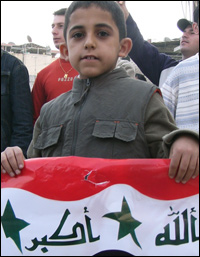|
|
"Iraq has seen the largest and most recent displacement of any UNHCR project in the world, yet even as more Iraqis are displaced and as their needs increase, the funds to help them are decreasing," said Harper. "This growing humanitarian crisis has simply gone under the radar screen of most donors."
 | |
In Syria alone, some 450,000 Iraqi refugees (PHOTO: © Hugh Macleod/IRIN)
|
Harper added that this reduction of funds had led to the suspension of a number of priority UNHCR projects. These include work to identify and aid the most vulnerable Iraqi refugees, including single mothers, the sick and the elderly.
UNHCR estimates that more than 1.5 million Iraqis are internally displaced in Iraq, including some 800,000 who fled their homes prior to 2003 and 750,000 who have fled since. A further 1.6 million Iraqis are refugees in neighboring countries, the majority in Syria and Jordan.
Donations to UNHCR's Iraq program from the United States, European Union nations, Japan and Australia have been in free fall since the start of the US-led occupation of Iraq, despite the ever-increasing numbers of refugees fleeing the deadly violence there.
From a high of $150 million in 2003, the UNHCR budget for its Iraq program fell to just $29 million in 2006. One quarter of that budget is allocated to meeting the needs of Iraqi refugees in neighboring countries Syria, Jordan, Turkey and Lebanon.
Syria hosts one of the largest Iraqi refugee communities in the region. Before the fall of former Iraqi president Saddam Hussein's government in April 2003, the number of Iraqis living in Syria was estimated to be 100,000. Local NGOs estimate the current Iraqi community in Syria to be 800,000.
A report released in May by UNHCR, the UN's children's agency (UNICEF) and the World Food Program concluded that an some 450,000 Iraqis in Syria "are facing aggravated difficulties" related to their "ambiguous legal status and unsustainable income." The population of Syria is nearly 19 million.
On 20 October, Ron Redmond, UNHCR chief spokesman, said some 40,000 Iraqis are now arriving in Syria each month.
Among Iraqi refugees living in the capital, Damascus, there is a sense of desperation that a vital lifeline looks set to be cut.
"We do not have jobs because there are thousands of Iraqis in Syria and without this help we are going to have to beg for money in the streets," said Haj Jamal, a 62-year-old Iraqi refugee living in Damascus.
"I urge in the name of all Iraqi refugees in Syria that the United Nations looks after this situation and remembers that without this support, thousands of newly poor people will be walking the streets of Syria next year," he added.
Laurens Jolles, UNHCR acting representative in Damascus, told IRIN that his office had requested a 2006 budget of $1.3 million but received only $700,000. This means its budget for 2006 amounted to less than one dollar a year to spend on each Iraqi refugee in Syria, without taking into account the refugee agency's operating costs and its expenditure on non-Iraqi refugees.
The majority of Iraqi refugees in Syria live in the suburbs of Damascus, in deteriorating socio-economic conditions. They have access to public schools and health care but have to travel out of the country every six months to renew their visas and cannot hold work permits, resulting in high unemployment.
"When Iraqis first came here they brought resources and many were not in need of assistance. Two years on, that situation has changed and many refugees are no longer able to look after themselves," said Jolles.
"The situation in Iraq is getting worse and there is no prospect of return. Without providing sufficient resources to help the host governments contain the refugee population there will be a secondary displacement of refugees to Europe. The time to do something is now."
UNHCR is now calling on donor countries to extend their funding of the Iraq program to a budget of around $25m for 2007.
© IRIN
[Integrated Regional Information Networks is a project the UN Office for the Coordination of Humanitarian Affairs. This article does not necessarily reflect the views of the United Nations or its agencies.]
Comments? Send a letter to the editor.Albion Monitor October
25, 2006 (http://www.albionmonitor.com)All Rights Reserved. Contact rights@monitor.net for permission to use in any format. |
|








